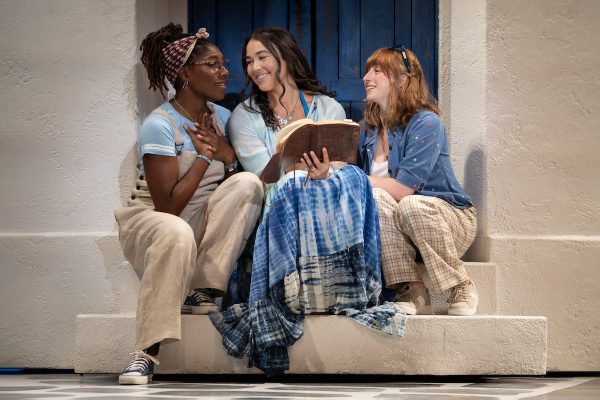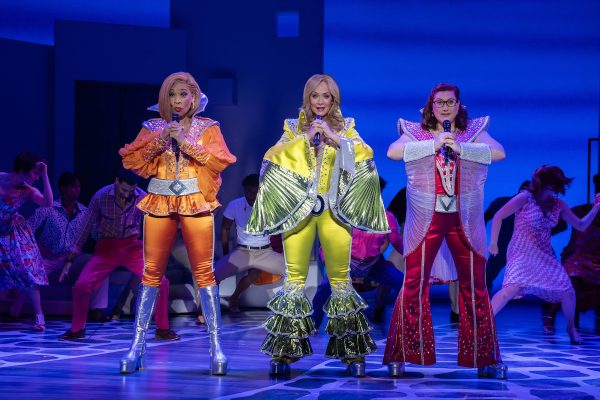A sea of bell bottoms, boas, and beachy attire filled the Citizens Bank Opera House on Sept. 27 as ‚ÄúMamma Mia!‚Äù hit the stage during its national tour.¬Ý
The legacy production opened at the Opera House on Sept. 24 and will play through Oct. 6 as part of the Broadway in Boston series, a program bringing Broadway shows to Boston theaters. Written by Catherine Johnson and directed by Phyllida Lloyd, the jukebox musical incorporates 22 hits from the Swedish pop group ABBA into a two-hour performance filled with high-energy singing and dancing that has audiences cheering, laughing, and on the edge of their seats.¬Ý
¬ÝSince its premiere in London in 1999 and on Broadway in 2001, ‚ÄúMamma Mia!‚Äù has had two film adaptations and five Tony nominations. This year marks the show‚Äôs 25th anniversary.¬Ý
¬ÝSet on a fictional island in Greece, the show follows Sophie (Alisa Melendez) on the eve of her marriage to Sky (Grant Reynolds). After reading her single mother Donna‚Äôs (Christine Sherrill) old diary, Sophie uncovers three potential birth fathers: Sam Carmichael (Victor Wallace), a stockbroker and divorc√©; Bill Austin (Jim Newman), a boisterous sailor and travel writer; and Harry Bright (Rob Marnell), an English banker and ex-rocker. On her quest to discover her father, she invites the three men to stay at her mother‚Äôs taverna and attend her wedding, upending her mother‚Äôs life into chaos, shenanigans, and heartache.
¬ÝBacklit by hues of turquoise and blue, Alisa Melendez opens the show with ‚ÄúI Have a Dream.‚Äù Her voice has a clear timbre, delicate and unwavering, even during the challenging low notes of ‚ÄúLay All Your Love On Me.‚Äù Her performance of ‚ÄúHoney, Honey,‚Äù alongside Haley Wright (Ali) and L‚ÄôOr√©al Roach√© (Lisa), sets the scene with lively choreography and laughter.¬Ý

¬ÝThe real fun begins when Donna‚Äôs friends and former bandmates of the fictional girl group, Donna and the Dynamos, enter the stage, including the wealthy, thrice-married Tanya (Jalynn Steele), and witty self-identified lone wolf cookbook author Rosie (Carly Sakolove), whose beautiful harmonies and comedic timing in ‚ÄúChiquitita‚Äù and ‚ÄúDancing Queen‚Äù stole the show. ‚ÄúMamma Mia!‚Äù alum Sakolove delivered every outrageous dance move expected from her character, throwing herself against the walls, floor, and co-star Newman in their steamy rendition of ‚ÄúTake a Chance on Me,‚Äù eliciting roars of laughter and cheers as patrons clapped along to the beat. Steele‚Äôs performance of ‚ÄúDoes Your Mother Know‚Äù with Patrick Park (Pepper) was highly anticipated. The two danced a flirtatious battle, and Steele‚Äôs control over her voice and prolonged vibrato had the audience cheering mid-performance.
¬ÝThe undeniable star of the show is Sherrill as Donna, who, having previously played the role, perfectly embodies the character in a way that is vulnerable, hilarious, and independent. Her powerful voice projects through the theater and her raspy tone adds to the raw emotion of ballads like ‚ÄúThe Winner Takes It All,‚Äù as she effortlessly belts high notes. But it was not just her technique that was impressive; her acting in ‚ÄúSlipping Through My Fingers‚Äù resonated with Donna‚Äôs struggle to give her child away and grapple with what‚Äôs left of their time together, bringing many to tears.¬Ý
¬ÝAs for the three father figures, Marnell‚Äôs sweet portrayal of Harry captured the hearts of many, Wallace‚Äôs deep, powerful tone in ‚ÄúKnowing Me, Knowing You‚Äù swept audience members away, and Newman‚Äôs husky voice and playful interactions with Sakolove made him a fan favorite.¬Ý
¬ÝConductor Matthew Croft‚Äôs seven-person band and Anthony Van Laast‚Äôs choreography deliver the intense energy that this musical demands in ‚ÄúMoney, Money, Money,‚Äù ‚ÄúLay All Your Love on Me,‚Äù and ‚ÄúVoulez-vous.‚Äù Production designer, Mark Thompson, and lighting designer, Howard Harrison, rely on simple schemes that call back on Greece‚Äôs iconic white buildings as backdrops, blanketed by various shades of pink and blue throughout the acts.¬Ý
¬ÝBesides the Dynamo‚Äôs performance of ‚ÄúSuper Trooper,‚Äù we do not see the ABBA-style jumpsuits and platform heels until after the curtain call. In one last performance, the company, dressed in iconic go-go suits, invites the audiences to dance and sing along to ‚ÄúMamma Mia,‚Äù ‚ÄúDancing Queen,‚Äù and ‚ÄúWaterloo.‚Äù Moments like these make ‚ÄúMamma Mia!‚Äù more than a musical‚Äîit‚Äôs a culture within itself.¬Ý
